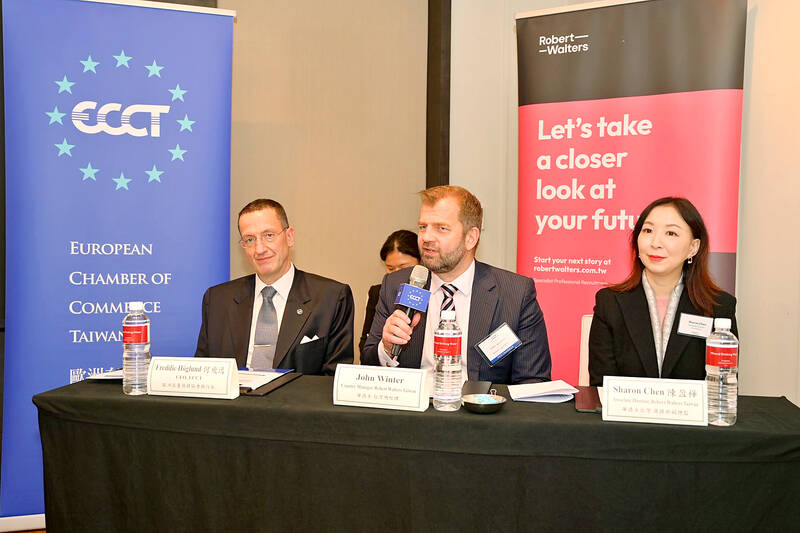A majority of Taiwanese employers plan to raise their headcount this year, while 33 percent are looking to maintain current levels, suggesting a steady recovery in the job market, a Robert Waters Taiwan survey showed yesterday.
A total of 52 percent of local firms aim to expand their payroll, but a striking 71 percent report difficulties in filling positions, particularly at manager and senior manager levels, the survey showed, as talent shortage remains a pressing concern.
“It is taking a much longer time to fill key roles,” Robert Walters Taiwan country manager John Winter said.

Photo courtesy of European Chamber of Commerce Taiwan
Organizations need to “sell” their benefits, flexibility arrangements, career development and support framework to prospective candidates and current employees to attract and retain talent, he said.
The top three challenges in sourcing staff are a lack of applications and supply of candidates, high salary and benefit expectations, and intense competition for candidates, the survey found.
Taiwan is set to maintain its global leadership in the technology sector, driven by groundbreaking advancements in artificial intelligence (AI) and other emerging technologies, it said.
These innovations are reshaping the information technology landscape and creating a surge in demand for skilled professionals, it said.
Engineers with expertise in large-system design, AI engineers and cybersecurity specialists remain among the most sought-after talent, Robert Walters said, adding that job movers with in-demand skills are eyeing salary increases of up to 20 percent.
The talent solutions firm also observed a broader shift in workforce priorities where job security has become paramount amid global economic uncertainties and the rapid evolution of technology.
That explained why Taiwanese professionals increasingly favor established corporations over risk-prone start-ups as they assign more importance to work-life balance, it said.
Taiwan’s technology sector also faces mounting environmental challenges, particularly in water scarcity, which threatens its supply chain, it said.
Industry leaders are investing in water recycling and conservation technologies to safeguard production and mitigate risks, it added.
By contrast, 91 percent of employers in the commerce sector plan to offer salary increases this year of between 1 and 5 percent, according to the survey.
Only 32 percent of non-tech professionals expressed optimism about job opportunities in their field, lower than the national average, the survey showed.
At the same time, Taiwanese organizations are prioritizing efficiency and cost controls, and adopting a cautious approach in talent management, as firms opt to reallocate internal talent over engaging in external hiring, Robert Walters said.
Consequently, organizational structures are growing flatter and operational roles are often shifted to regional hubs or outsourced, it said.

Meta Platforms Inc offered US$100 million bonuses to OpenAI employees in an unsuccessful bid to poach the ChatGPT maker’s talent and strengthen its own generative artificial intelligence (AI) teams, OpenAI CEO Sam Altman has said. Facebook’s parent company — a competitor of OpenAI — also offered “giant” annual salaries exceeding US$100 million to OpenAI staffers, Altman said in an interview on the Uncapped with Jack Altman podcast released on Tuesday. “It is crazy,” Sam Altman told his brother Jack in the interview. “I’m really happy that at least so far none of our best people have decided to take them

BYPASSING CHINA TARIFFS: In the first five months of this year, Foxconn sent US$4.4bn of iPhones to the US from India, compared with US$3.7bn in the whole of last year Nearly all the iPhones exported by Foxconn Technology Group (富士康科技集團) from India went to the US between March and last month, customs data showed, far above last year’s average of 50 percent and a clear sign of Apple Inc’s efforts to bypass high US tariffs imposed on China. The numbers, being reported by Reuters for the first time, show that Apple has realigned its India exports to almost exclusively serve the US market, when previously the devices were more widely distributed to nations including the Netherlands and the Czech Republic. During March to last month, Foxconn, known as Hon Hai Precision Industry

PLANS: MSI is also planning to upgrade its service center in the Netherlands Micro-Star International Co (MSI, 微星) yesterday said it plans to set up a server assembly line at its Poland service center this year at the earliest. The computer and peripherals manufacturer expects that the new server assembly line would shorten transportation times in shipments to European countries, a company spokesperson told the Taipei Times by telephone. MSI manufactures motherboards, graphics cards, notebook computers, servers, optical storage devices and communication devices. The company operates plants in Taiwan and China, and runs a global network of service centers. The company is also considering upgrading its service center in the Netherlands into a

Taiwan’s property market is entering a freeze, with mortgage activity across the nation’s six largest cities plummeting in the first quarter, H&B Realty Co (住商不動產) said yesterday, citing mounting pressure on housing demand amid tighter lending rules and regulatory curbs. Mortgage applications in Taipei, New Taipei City, Taoyuan, Taichung, Tainan and Kaohsiung totaled 28,078 from January to March, a sharp 36.3 percent decline from 44,082 in the same period last year, the nation’s largest real-estate brokerage by franchise said, citing data from the Joint Credit Information Center (JCIC, 聯徵中心). “The simultaneous decline across all six cities reflects just how drastically the market